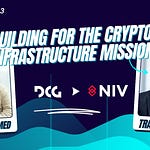Baek Kim is a General Partner at Hashed, a crypto native VC focussed on bridging the ecosystem in US and Asia. Prior to this Baek was a software engineer at AWS working on IoT and Robotics. He was also the founder of a last-mile logistics startup.
We talk about his entry into crypto VC, Hasheds’ thesis, crypto gaming, the Asian market and more!
The podcast is also available on your favourite podcast sources like Spotify, Apple and Youtube!
NA: I would love to start with your background and how you got into the world of venture capital?
BK: I was always passionate & interested in the venture and startup industry, but always thought venture capital is something that I would get into when I'm successful and built my business and have, a lot of different insights to share with the up-and-coming or new generation of founders.
As I started doing more and more, building and meeting people and learning about the landscape, I thought there were many different ways to add value rather than just being that one smart guy in the industry. My journey started in college where I studied robotics and computer engineering at CMU, and I noticed that CMU for how good of an engineering program they had, didn't really have any entrepreneurship or sub-ecosystem dedicated to an undergraduate student. So I told my professor, why is that the case? We should change that. And we started a program called Innovation Scholar Fellowship where the students are future potential founders.
We give them grants and mentorship, and pair them with the alumni founders and funds, to get more exposure to what's outside of the campus. What can you build, and how Silicon Valley is run?
That really opened my eyes to what it's like to be in the venture capital scene. That was actually when I first found out about Bitcoin as well. As part of the program, I think it was my sophomore or junior years that we went to Columbia University and then we visited Boost VC.
He (Adam Draper) was just talking to CMU students for two hours just about Bitcoin. He said his funds are doing sci-fi investments. I thought, wow, this really, wealthy, son of a billionaire doing something really odd. I didn't really pay attention to that since it's something really odd.
And I was studying robotics. I had a high ego as an engineering student that this is like the future. In retrospect, there were many different opportunities early in crypto and in the blockchain space. But you know, I at least started getting myself into the startup industry and venture. During school and after school, I did my start-up in the field, for about a year and a half, and didn't really take off.
I went back to Amazon to get a salary for a couple of years. I started becoming restless and had to do something new, more exciting. I think that's when I fully got into crypto where after I get off work from Amazon at six I just do crypto all the way until like midnight with my roommate.
My roommate was also cruising at Microsoft where he would be just studying different white papers every day after school at the University of Washington library. It just became a full-time thing. I was fortunate enough to be connected to current Hashed partners at the time who were also engineering background founders who exited a few times and Simon who was running the mass education startup funded by SoftBank.
He reached out saying, Hey, we are thinking about making this into a more structured fund, and we were going to scale so that we can build a brand and we can support founders in a scalable manner. I thought this is really interesting for the startup industry where I've always been interested in the venture, but never really seen this passionate group of people, almost religious, in building something that doesn't really have any infrastructure today.
That kinda got me in more. Then when Simon said he was going to build Hashed I ended up moving to Korea and joined the fund in Seoul investing actively since then.
NA: That's super exciting. So it's definitely been like a long journey, but it's great to see you actively investing in crypto now. I guess, could you expand then on the changes that Hashed has gone through since the time that you've joined to what it is now and the general thesis of things that you look at?
BK: Yeah. Our thesis has always been the same in that we do anything to push mass production of crypto we have two main focus areas.
One is web3 infrastructure side and then the second part is gaming and metaverse, the infra side is quite obvious. On the gaming side, we got a lot of questions in the early days. Now, we thought, if you're pushing for the adoption of crypto, we got to find the best channel for adoption, and going to offline stores and restaurants would be too much heavy lifting and we wanted to stay within the digital economy.
When you think about the digital economy there are a few large sectors like e-commerce and others in gaming, E-sports. We noticed that gaming is one of the fastest growing, most engaging, and also the community style and the DNA were very similar to what we see today in crypto, like discord channels of DAOs and all that.
It has a very similar atmosphere and vibe. So we decided to focus on those two. Then on the other thesis, gaming and the first deal that we did was Axie Infinity, in 2018. We were very lucky to meet the team, in Ho Chi Minh, Vietnam at the time we were experimenting with a program called Hashed Labs where we ran one batch of gaming accelerator programs because I mentioned that gaming is going to be our thesis.
But we noticed that there were no gaming founders in the market in 2018, because the only games you see are like Tron bats or EOS and like really sketchy, speculative unsustainable gambling types of founders that are looking for a short exit. We were looking for genuine founders to make our focus more visible to the market.
We ran an accelerator and the Axie guys happened to be the first ones to apply and we became an advisor. Then we became their first check in their seed round. Which led to also inviting Sandbox to our program, which has now become the leading open metaverse Roblox and blockchain project.
Where we are advisors to them and led the seed round. That’s been our early thesis has evolved and we are very fortunate that those early bets became not just products or successful businesses, but became vibrant ecosystems in their own ways that we continuously reinvest back into those ecosystems, to, incubate early teams and build on those acquisitions as well.
NA: There's a lot of conversation about how VCs, crypto VCs, fit into the land of crypto and decentralized networks. What are your thoughts on how VCs fit into the world of crypto and being able to essentially invest early into these projects and end up owning large amounts of, the network? What's your point of view and Hasheds point of view, around that kind of argument?
BK: We're all figuring out, still, what VC means in this space. In the early days of VC in crypto, it was bringing the concept of institutional investing into the crypto space that can write the checks. They didn't really understand what it means to participate in governance or participate in a validator program or whatever.
But the bar is continuously going up and also the funds are learning what the limitations they have and what they are soft at and what they're good at, and also founders are starting to figure out these VCs were helpful, these VCs were not helpful. They had good intentions, but couldn't do it for these reasons.
I think before it was all kinds of macro bets by VCs and also founders. And the founders were going for major thesis on, we were going to replace computing with blockchain or kind of replace contents with NFTs and VCs are also jumping on that thesis that, Hey, we'll invest in these areas that will cover these theses. Rather than going for this specific product market fit, rather there's this kind of momentum we're going to see in this market opportunity. It didn't really happen until very recently. So I think we're still figuring that and Hashed as a fund we've been also learning a lot. Investing in the industry as a crypto native investor, the past five years, what it really means to be invested and I think one thing that we really, learn and emphasize a lot is participation. I think investing in tokens and investing in networks is really the ticket to becoming a major participant in those networks. And I really think about these chains and protocols at launch, as you put it VCs own most of the initial share of the network.
And it's very irresponsible to not utilize those shares. Whether that's staking, validating or utilizing that for liquidity or, building something, you are the major owner and the operator of the network in a way. And if you are just holding onto it without doing anything and just waiting for the appreciation, that's just the web2 model of VC.
And that's how our fund grew as well. Where if we were one of the first funds to run validators for all our major portfolio companies and, whenever I go on like a testnet call for our port cos. I was like the only VC and other people were like Figment, Stakefish and like these guys had asked me, oh, why are you running this?
And I'm like, I used to work at AWS and our team is all technical. We are actually running our validator ourselves and, we can do this cause we operate with our own money, we don't need to get permission from LPs to run it. So that kind of worked out for us. and that was like 2018-19.
And after that, all of the funds started running, through different technical partners on their own. And we thought that's a commodity, right? What can we do more? And we realized that governance is actually getting more and more intense and actually important right before governance was more like something happening, but nothing mission critical, but now actual each vote of governance is changing, and the token model or actual price action of these networks. became more serious and, being, participating as like a responsible, major shareholder, to share our opinion and share our thesis on where this protocol should go, has been one thing.
And then we realized that there are many ways that we can get creative to help our, portfolio. We have a massive capital that we can utilize for our portfolio ecosystem. We realized Hey, these DeFi protocols and others when they launched, struggled to bootstrap liquidity because one, retail didn't know, two, retail is concerned about initial security and, experience because when liquidity is small, they're going to experience impermanent loss or are worried that someone might manipulate it, it just adds a lot of friction points. So we realised that we could utilize the capital to support our portfolio launching. Provide anywhere from 10 to 200 million worth of capital, whether that's to staking or TVL their initial pool, so the end-users of those companies can have a smooth experience where you're not worrying too much about the problem of being early in a DeFi protocol. And our finest team started working with those portfolios on designing, how to design those mechanisms and launch plans on the liquidity side.
So that's been the main thing we learned we can be helpful. So it's like starting with like kind of zero to one, with funding, help them build up their organization, participating in the network, to secure the network as a validator, governance. And then when they launch, we help them with the liquidity so that they can provide a better experience for the market.
NA: Yeah, I think there are some great points. It is definitely, understanding that there's a lot more value that crypto VCs can provide and it's native to the product into the protocol. that's definitely a really interesting way that you guys go about it. And you guys are quite active, in terms of investors across geographies. So actively investing in Asia and the US I'd love to understand, some of the interesting differences, that you've seen investing across these markets.
BK: There is a cycle that these go through. There's been a convergence and divergence, but I think in Corona times past two years, there have been many divergences between these two economies, and ecosystems, mainly because Asia has been completely shut down and made it really hard for foreigners to enter the country and physically be present to interact and learn about the ecosystem. Also one of the fastest-growing moments for crypto ecosystems, with a lot of new talents to come in, a lot of new capital came in and each ecosystem has grown in its own ways and is global in its own DNA.
And we, as a fund, don't care too much about bringing US projects to Asia or Asia projects to the US, but, we focus on being global while our efforts stay very local. What I mean by that is we go to our founders, start their business and we go to talent experimenting with crypto. So that's why we built, our newest office in Bangalore, India. We have seven people based there physically, all local hires and we have been learning about Indian founders and the market via investing in eight different companies in the past five years, through our venture partner based there.
And we converted him to our head of India and launched the team that. And most of the members are actually, researchers and they focus on people, we have lawyers that help early founders coming in from that space to know how to build web3 organizations, rather than just looking for this different investor opportunity to put in capital, which I think a lot of crypto funds are doing? But we noticed that it's quite odd to see that still at this point, there are no active crypto funds on the ground in India or any of the Asian markets today.
NA: I think those are some amazing points. And I think to run into some of our final questions, I would love to hear about a secret obsession of yours. That not many people know about?
BK: I think my obsession is being a power user. And this is something that I always ask when someone is interviewed for Hashed or our portfolios or anyone that says they're interested in learning more about crypto or, starting something or, getting a job in the crypto space.
I always tell them the first step to entering the crypto space is becoming a power user because it is an interesting industry. There is a very vague boundary among the three roles that define the industry, one is the user, the second is the builder and the third is the investor. And I noticed that everyone is actually doing all of these three roles.
I am an investor in a professional way, the main job, but we're also building a studio actually launching things. And also I am a power user. I use many of our portfolio ecosystems and products, and, that's how I usually stay on top of what changes are happening in these products. What changes are happening in UX and what improvements are happening via infrastructure that offers a new form of engagement.
And I think many people, especially those coming into the crypto space, are afraid to waste time, spending time on, the wrong products or, wasting time trying to figure out how to use them, which is not something that you should be too worried about. I think all of those times wasted actually become a way to grow whatever insights you might have down the line as a crypto person.
NA: No doubt. I think being an active user is definitely, it is the best way to learn when you're starting to get into crypto. Finally, could you talk about the latest investment you've made and why did you make it?
BK: Yeah, we made so many investments in early this year, but I think something that really comes to my mind is Everyrealm, that we made the investment, which started as Republic Realm, which was kind of a subsidiary of a company called Republic, which is also in our early-stage investment portfolio. It is it's like Angelist where it democratises investing into private stocks, especially the kind of up-and-coming unicorn startups, and also for crypto where they also offer CoinList-like offerings for crypto projects to raise from the public in a compliant manner.


Republic Realm and now Everyrealm is an interesting holding company that's being the real estate developer in metaverse space and we noticed that they were already working with all of our portfolio companies, such as Sandbox, Axie, Nifty Island, League of Kingdom, Derby Stars on how to buy land, where to buy and if when they buy, what to do with it, whether they're building a museum, building a gallery building unity game on top, they really make each matter of our space, unique and interesting, basically building a new layer of contents on these lands that are purely a speculative trading market today, especially when you look at early days of Sandbox when they did initial land offering, they're making each land unique and have a story and they're doing it in a most systemic and compliant way where many of the efforts have been done by freelancers and, individuals or fans or DAOs.
But we thought the way Everyrealm is doing it is almost like a house, landscape or real estate developers in, let's say like new regions like China and Dubai come in and create a whole land development plan on what it's going to be and why it's going to be big.
So that's been something that I thought was one of the most interesting approaches and something that's been very synergetic with what we already do as investors and builders. So basically when we build games from our studio, they can come on board either as an investor or as a participant to create more content, as a partner and there are people doing that across different platforms and also advising and helping, traditional brands or automakers or fashion brands to interact with our portfolio companies in the Metaverse setting, whether that's NFT collections or designing their own metaverse, or, creating a.one-time event or concert, that can raise their brand awareness among metaverse community, especially with genZ.
NA: That's definitely a really interesting company. I think, owning this space of being the builders and the med versus it's definitely super interesting. but yeah, those are all the questions I had Baek. Thank you so much again for coming on. I really enjoyed the conversation.
BK: It was really great. thank you for having me.
Follow me and Baek on Twitter here!
Disclaimer: The Inquisitive VC is provided for informational and educational purposes only and is not intended to provide commercial, financial or legal advice. Nothing in this article constitutes an offer of securities or regulated financial products or financial services to any persons or a solicitation to buy or sell any tokens or securities or to make any financial decisions. Do not trade or invest in any project, tokens, or securities based upon this podcast episode. The host and guests may personally own tokens or be an investor in projects that are mentioned on the podcast.











